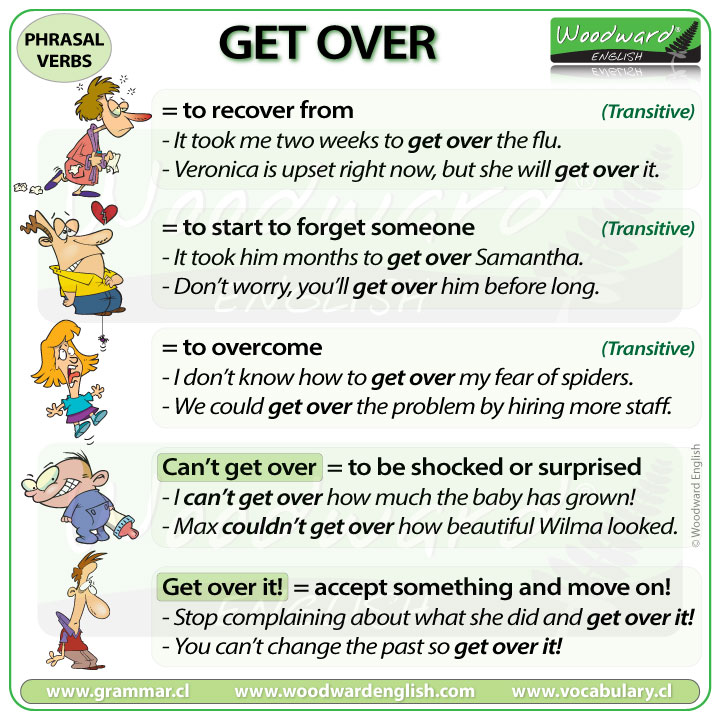The English phrasal verb GET OVER has the following meanings:
1. Get over = to recover from
(transitive) To recover from something such as when you have been sick or not feeling well (sad, disappointed, etc.) and you are now feeling better. To return to your normal state of health. It can also refer to emotionally recovering from an unhappy experience.
- It took me two weeks to get over that flu.
- I was really disappointed to not get that job; it took me a few days to get over it.
- I’m sad about losing the championship game, but I will get over it.
- Veronica is upset right now, but she will get over it.
- How long did it take you to get over the food poisoning?
- He has found it difficult to get over the loss of his wife.
You will notice how with this meaning, it is common to end with the object pronoun it… get over it.
This is because in this case IT normally refers to the situation or condition.
2. Get over (someone) = to start to forget someone
(transitive) This is typically used when a relationship has ended and the person starts to forget about their partner, they start to feel happy again and continue with their life. In a way, this meaning is similar to the first in that you are trying to recover from the end of a relationship.
- It took him months to get over Samantha.
- Don’t worry, you’ll get over him before long.
- It can sometimes take a very long time to get over someone you loved.
- It didn’t take you long to get over your ex!
3. Get over = to overcome
(transitive) To overcome an obstacle or difficulty. To find a way to solve a problem or deal with a difficult situation.
- I don’t know how to get over my fear of spiders.
- He found it difficult to get over his separation but now he is fine.
- We could get over the problem by hiring more staff.
- You need to get over your fear of phrasal verbs.
4. Can’t get over = to be shocked or surprised
(transitive) When you see or hear something that surprises you or that you were not expecting to happen.
- I can’t get over how much the baby has grown!
- Max couldn’t get over how beautiful his wife looked tonight.
- That movie has such a fantastic ending; I can’t get over how good it was.
5. Get over it! = accept something and move on
(transitive) When someone tells you “to get over it” it means they want you to accept something that has happened and for you to continue with your life without continually thinking about what has happened.
- You should stop complaining about what she did to you. Get over it!
- You can’t change the past so get over it!
- It happened such a long time ago. Why don’t you just get over it?
Get over – Summary Chart

